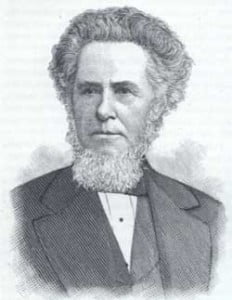Boardman and Boice – Two Teaching Elders of Tenth Presbyterian
They were one hundred and twenty years apart in the pulpit and pastoral ministry of the historic Tenth Presbyterian Church of Philadelphia, Pennsylvania. But they both have a common identity in more than one way which this author finds interesting.
 First, they were a part of the famous “B’s” of the church. On their own website, someone takes note that there were five “B’s” who filled the pulpit of Tenth Presbyterian. Each pastorate was characterized as being of long length. They were: Henry Augustus Boardman (1833—1876, or 43 years long); William Pratt Breed (1856 to 1889 or 33 years long); Marcus A Brownson (1892 – 1924, or 27 years long); Donald Grey Barnhouse (1927 – 1960 or 33 years long); and James Montgomery Boice (1968 to 2000, or 32 years long). The reader can see the first and the last names of this distinguished list of “B’s” being the two subjects of this post.
First, they were a part of the famous “B’s” of the church. On their own website, someone takes note that there were five “B’s” who filled the pulpit of Tenth Presbyterian. Each pastorate was characterized as being of long length. They were: Henry Augustus Boardman (1833—1876, or 43 years long); William Pratt Breed (1856 to 1889 or 33 years long); Marcus A Brownson (1892 – 1924, or 27 years long); Donald Grey Barnhouse (1927 – 1960 or 33 years long); and James Montgomery Boice (1968 to 2000, or 32 years long). The reader can see the first and the last names of this distinguished list of “B’s” being the two subjects of this post.
A second feature shared by both Revs. Boardman and Boice were the major shifts in affiliation which took place during each of their ministries. In the case of Pastor Boardman, just as he was to be ordained and installed as pastor of the church by the Second Presbytery, which was a presbytery of the New School, that presbytery was dissolved by the Synod of Philadelphia, which was Old School Presbyterian! The whole issue would not be made final until the General Assembly would meet the following month of May, when the General Assembly lopped off all New School Presbyteries from the rolls of the church.(See details on our January 9, 2013 post). Pastor Boardman was able to finally align the congregation of Tenth Presbyterian with the Old School folks.
 Then in the case of James Boice, it was during his pastorate that the Session (board of elders) at Tenth was coming to terms with the fact that their denomination, the United Presbyterian Church in the U.S.A. was straying from biblical orthodoxy. In 1979, Tenth Presbyterian Church managed to leave that denomination and join the Reformed Presbyterian Church, Evangelical Synod denomination. Three years later, that denomination joined the Presbyterian Church in America, and so Tenth Presbyterian became a member church of the PCA.
Then in the case of James Boice, it was during his pastorate that the Session (board of elders) at Tenth was coming to terms with the fact that their denomination, the United Presbyterian Church in the U.S.A. was straying from biblical orthodoxy. In 1979, Tenth Presbyterian Church managed to leave that denomination and join the Reformed Presbyterian Church, Evangelical Synod denomination. Three years later, that denomination joined the Presbyterian Church in America, and so Tenth Presbyterian became a member church of the PCA.
Lastly, we note an interesting sign of God’s providence, namely, it was on this day in Presbyterian history, June 15, that both pastors—Henry Augustus Boardman and James Montgomery Boice—were called into the presence of their Lord and God. Henry Boardman died on June 15, 1880, and James Boice died this same day of the year, June 15, in 2000.
Words to Live By:
There is no such thing as “chance” or “fortune” or “luck” in the annals of biblical history. All events, happenings, and actions fall under the sovereign will of God who moves when and where and how He pleases. Some people (and hopefully not our readers of this web magazine) may find the above similarities odd, but we who receive the whole counsel of God know that the God of the Bible plans all of our actions according to His sovereign will for our lives. Let that biblical truth permeate your life this day, and always.
For Further Reading:
Rev. Rick Phillips, pastor of Second Presbyterian church in Greenville, SC, has written of his friendship with Dr. James Boice. Click here to read his recent article.

